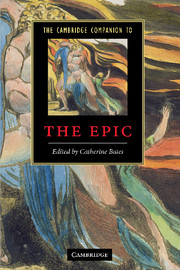Book contents
- Frontmatter
- 1 The Epic of Gilgamesh
- 2 Greek epic
- 3 Roman epic
- 4 Heroic epic poetry in the Middle Ages
- 5 Dante and the epic of transcendence
- 6 Italian Renaissance epic
- 7 Camões’s Os Lusíadas: the first modern epic
- 8 The Faerie Queene: Britain’s national monument
- 9 The seventeenth-century Protestant English epic
- 10 Mock-heroic and English poetry
- 11 Romantic re-appropriations of the epic
- 12 Ezra Pound, T.S. Eliot, and the modern epic
- 13 Derek Walcott’s Omeros
- 14 Epic in translation
- Guide to further reading
- Index
1 - The Epic of Gilgamesh
Published online by Cambridge University Press: 28 May 2010
- Frontmatter
- 1 The Epic of Gilgamesh
- 2 Greek epic
- 3 Roman epic
- 4 Heroic epic poetry in the Middle Ages
- 5 Dante and the epic of transcendence
- 6 Italian Renaissance epic
- 7 Camões’s Os Lusíadas: the first modern epic
- 8 The Faerie Queene: Britain’s national monument
- 9 The seventeenth-century Protestant English epic
- 10 Mock-heroic and English poetry
- 11 Romantic re-appropriations of the epic
- 12 Ezra Pound, T.S. Eliot, and the modern epic
- 13 Derek Walcott’s Omeros
- 14 Epic in translation
- Guide to further reading
- Index
Summary
The name 'Epic of Gilgamesh' is given to the Babylonian poem that tells the deeds of Gilgamesh, the greatest king and mightiest hero of ancient Mesopotamian legend. The poem falls into the category 'epic' because it is a long narrative poem of heroic content and has the seriousness and pathos that have sometimes been identified as markers of epic. Some early Assyriologists, when nationalism was a potent political force, characterized it as the 'national epic' of Babylonia, but this notion has deservedly lapsed. The poem's subject is not the establishment of a Babylonian nation nor an episode in that nation's history, but the vain quest of a man to escape his mortality. In its final and best-preserved version it is a sombre meditation on the human condition. The glorious exploits it tells are motivated by individual human predicaments, especially desire for fame and horror of death. The emotional struggles related in the story of Gilgamesh are those of no collective group but of the individual. Among its timeless themes are the friction between nature and civilization, friendship between men, the place in the universe of gods, kings and mortals, and the misuse of power. The poem speaks to the anxieties and life-experience of a human being, and that is why modern readers find it both profound and enduringly relevant.
- Type
- Chapter
- Information
- The Cambridge Companion to the Epic , pp. 1 - 12Publisher: Cambridge University PressPrint publication year: 2010
- 4
- Cited by



